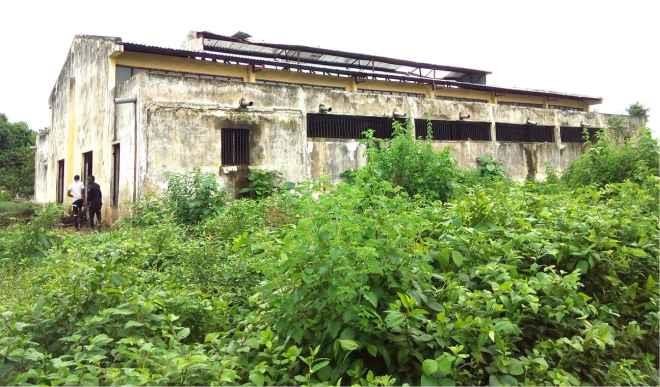Poor state of Abaji abattoir endangers residents
The poor state of the abattoir in Abaji is raising concerns among residents about the attendant health risk. Residents worry not only about the unhealthy environment, but how meat is processed and transported as well. Instead of tab water, every butcher patronises water vendors for water to clean slaughtered animals and the meat is conveyed […]


The poor state of the abattoir in Abaji is raising concerns among residents about the attendant health risk.
Residents worry not only about the unhealthy environment, but how meat is processed and transported as well.
Instead of tab water, every butcher patronises water vendors for water to clean slaughtered animals and the meat is conveyed on motorcycles to various markets on.
The dilapidated abattoir, located behind the Abaji main market, lacks basic amenities including waste channels, water supply and electricity.
The stench from the abattoir is also cause for serious discomfort for the residents due to the huge animal wastes dumped behind the abattoir.
The animal slaughter facility which was built in 2001, by the FCT Agricultural and Rural Development Secretariat (ARDS) and located then in the outskirts of Abaji, has been caught up in the sprawling development of residential houses.
Residents spoken to said they found it difficult to breathe and have to cover their noses while passing by the abattoir because of the odour.
Aliyu Musa, who resides at the back of the abattoir, said the bad smell from the slaughter house posed a health hazard to him and his family.
He said he finds it difficult to spend time outside his house due to the bad smell of cow waste while his frequent complaints to the head of butchers in the area did nothing to ease the situation.
“Most of my neighbours barely stay outside for about 10 minutes because of the bad smell which increases at the peak of the rainy season,” he said.
Another resident, Michael Joshua, said the bad state of the abattoir especially lack of good drainage had led to indiscriminate dumping of the cow waste in the area. He said the situation had continued to expose them to danger.
“I think it is high time concerned authorities did something in sanitising the place, because aside the stench, the abattoir itself is unhygienic and they slaughter cows and process the meat there,” he said.
Our reporter observed during the visit that most of the animals are slaughtered in an unhygienic condition. Some parts of the roof of the slaughter house have been blown off.
A butcher, Saidu Hamza, said they do their best to ensure that the abattoir is kept clean, adding that they have a borehole for water to clean the meat after the animals were slaughtered.
“Those that slaughter cows here always buy water from vendor to flush the waste outside, as the overhead tank which supplies water to this place has not been functioning for some years now,” he said.
The head of butchers in the area, Alhaji Bashir Musa, said since they took over the facility some years ago, there have been many challenges, especially lack of water.
He said he has met with the ARDS staff and butchers from other area councils where he told the officials about the poor state of the abattoir but nothing has been done.
He said they paid N800 for each cow slaughtered and have to patronise water vendors in order to clean over 15 cows slaughtered on each market day. He said they slaughtered about eight cows on other days.
“We are faced with challenges of lack of water and instead of using truck to convey meat to the market which the ARDS ought to have provided, we now use motorcycles,” Alhaji Bashir said.
He also said that there is no electricity for them to preserve the beef as obtainable in some places, adding that the generators at the abattoir stopped working many years ago.
“It is obvious that where cows are slaughtered on daily basis should have a good source of water to enhance good hygiene. And that is why most of my people complain of lack of water all the time, unfortunately, the authorities are yet to do anything about it,” he said.
Bashir said he was yet to receive a response from the area council on his request for sanitary officials among measures at keeping the facility clean.
He said septic tanks which the waste ought to be channelled to were already filled up.
The Abaji Area Council Chairman, Abdulrahman Ajiya, said he was disturbed over the unhygienic state of the abattoir which was why it was among the first places he visited when he assumed office.
He said the council would summon the manager of the abattoir in order to find out how to address some of the challenges, especially lack of water.
While commenting on the dilapidated state of the slaughter house and absence of infrastructure, the abattoir manager, Dr Hussaini Idris, said he had already written to the ARDS about it.
He said the abattoir would be renovated soon adding that the agricultural secretariat is currently renovating the abattoir in Gwagwalada.
“I normally evacuate waste and put chemical. I also fumigate the entire place because of the bad odour because wastes no longer flow into the septic tank. But there is no way you can eradicate odour within the abattoir premises,” he said.
He said the bad odour could not be completely cleared, but minimised, even as he blamed some residents of the area of building houses close to the abattoir.
